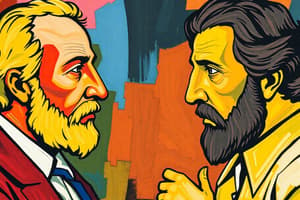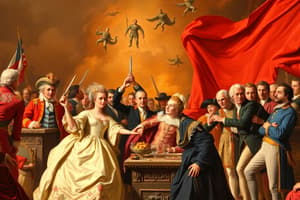Podcast
Questions and Answers
The ______ was the agreement that ended World War I.
The ______ was the agreement that ended World War I.
Treaty of Versailles
President Woodrow Wilson’s plan for peace was known as the ______.
President Woodrow Wilson’s plan for peace was known as the ______.
Fourteen Points
The ______ was created in 1920 to promote international cooperation and peace.
The ______ was created in 1920 to promote international cooperation and peace.
League of Nations
The ______ of 1928 was an agreement by 15 nations pledging not to go to war.
The ______ of 1928 was an agreement by 15 nations pledging not to go to war.
The ______ was a fear of the growth and spread of Communism in the U.S.
The ______ was a fear of the growth and spread of Communism in the U.S.
Nativism favors the interests of American-born people over ______.
Nativism favors the interests of American-born people over ______.
Isolationism is characterized by opposing American involvement in ______.
Isolationism is characterized by opposing American involvement in ______.
During Prohibition, a ______ was a secret place where alcohol was sold and consumed.
During Prohibition, a ______ was a secret place where alcohol was sold and consumed.
Communism is a system of government with one political party that controls the ______ of all property.
Communism is a system of government with one political party that controls the ______ of all property.
The ______ trial involved a biology teacher arrested for teaching evolution.
The ______ trial involved a biology teacher arrested for teaching evolution.
Fundamentalism is a religious movement that believes the stories of the Bible are ______ true.
Fundamentalism is a religious movement that believes the stories of the Bible are ______ true.
Militarism refers to the building up of armed forces in preparation for ______.
Militarism refers to the building up of armed forces in preparation for ______.
The Great Migration refers to the large scale movement of blacks from the South to the ______.
The Great Migration refers to the large scale movement of blacks from the South to the ______.
Flashcards
Allies (World War I)
Allies (World War I)
The alliance between England, France, Russia, and the United States during World War I.
Fourteen Points
Fourteen Points
President Woodrow Wilson's plan for peace after World War I, consisting of 14 points aimed at preventing future wars.
League of Nations
League of Nations
An organization created in 1920 to promote international cooperation and peace, aimed at preventing future wars.
Treaty of Versailles
Treaty of Versailles
Signup and view all the flashcards
Red Scare
Red Scare
Signup and view all the flashcards
Nativism
Nativism
Signup and view all the flashcards
Militarism
Militarism
Signup and view all the flashcards
Communism
Communism
Signup and view all the flashcards
Prohibition
Prohibition
Signup and view all the flashcards
Speakeasy
Speakeasy
Signup and view all the flashcards
Bootlegger
Bootlegger
Signup and view all the flashcards
Fundamentalism
Fundamentalism
Signup and view all the flashcards
Selective Service Act
Selective Service Act
Signup and view all the flashcards
Study Notes
Political and Social Ideologies
- Nativism: Favors the interests of American-born citizens over immigrants.
- Isolationism: Opposes American involvement in foreign affairs.
- Communism: A system where one political party controls all property.
- Nationalism: Extreme love for one's country.
- Militarism: Building up armed forces for war.
- Anarchist: Someone who opposes all forms of government.
Historical Periods and Events
- Prohibition: Period (1920s) when manufacturing and sale of alcohol was banned.
- Speakeasy: Secret place where alcohol was sold during Prohibition.
- Bootlegger: Person who smuggled alcohol into the U.S. during Prohibition.
- Fundamentalism: Religious movement believing biblical stories are literally true.
- Flappers: Free-thinking young women embracing liberal attitudes (1920s).
- Installment Plan: Paying for an item in small amounts over time, instead of all at once.
- Quota System: Policy limiting the number of immigrants allowed into a country per year.
- Trench Warfare: Military strategy of attacking from fortified ditches.
- Xenophobia: Unreasonable fear of foreigners or things deemed foreign.
- Propaganda: Biased information designed to influence public opinion.
- Reparations: Payments made by a losing nation to a winning nation after a war.
- War Guilt Clause: Part of the Treaty of Versailles that blamed Germany for starting WWI.
- Sacco and Vanzetti: Italian immigrants falsely accused and executed for murder.
- Espionage/Sedition Acts: Laws punishing those speaking against U.S. involvement in WWI.
- Scopes Trial: Case where a biology teacher was arrested for teaching evolution.
- Teapot Dome Scandal: Government secretly leasing public land to private companies for bribes.
- Central Powers: Germany, Austria-Hungary, and Ottoman Empire in WWI.
- Zimmerman Note: Message from Germany to Mexico promising U.S. territory in exchange for support in WWI.
- Lusitania: British passenger ship sunk by Germany in 1915.
- Selective Service Act: Law requiring men to register for military service.
- Harlem Renaissance: Growth of African American art, music, and culture (1920s).
- Great Migration: Large-scale movement of African Americans from the South to the North.
- Allies: England, France, Russia, and the United States in WWI.
- Fourteen Points: Woodrow Wilson's plan for peace after WWI.
- League of Nations: Organization created to promote international cooperation and peace.
- Treaty of Versailles: Agreement ending World War I.
- Kellogg-Briand Pact: Agreement among nations promising not to wage war.
- "No Man's Land": Area between opposing trenches in WWI, filled with hazards.
- Consumerism: Increasing purchasing of material goods.
- Washington Naval Conference: Agreement to limit the number of naval warships.
- Rosewood Massacre: Mob violence in Florida against black community.
- 18th Amendment: Amendment banning the production and sale of alcohol.
- Palmer Raids: Series of arrests targeting immigrants and suspected communists.
- Fordney-McCumber Tariff: Tax on European imports to protect American businesses.
- Red Scare: Fear of communism spreading in the U.S..
- Committee of Public Information: Government agency using propaganda for WWI support.
Studying That Suits You
Use AI to generate personalized quizzes and flashcards to suit your learning preferences.




